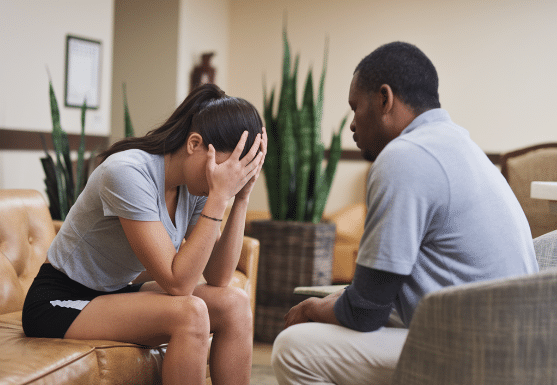Athletes generally serve as public symbols who demonstrate fortitude together with discipline and determination. Numerous athletes manage to overcome physical goals yet encounter mental health difficulties. The combination of performance pressure together with physical injuries, competition anxiety, and life-work responsibilities creates deterioration of athlete well-being. Athletic care for mental health requirements must be treated with equal importance to physical workout training programs.
Various techniques, together with dedicated mental health services for athletes, exist alongside support networks that facilitate both psychological maintenance and improvement of athletic mental health. This blog explores effective methods for improving athlete mental health, as well as strategies that promote whole-person wellness.
1. Recognizing the Importance of Mental Health
Athletic persons need mental health support at the same level they require physical health support. The majority of athletes choose to push aside emotional and psychological distress until problems emerge in sports competitions or their existence. The understanding that mental wellness holds importance initiates the process of professional help and beneficial conduct adoption.
2. Seeking Mental Health Counseling and Therapy
Athletes gain complete transformation through mental health counseling services. Professional counseling services with mental health specialists create space for athletes to examine their stress, anxiety, and depression and discuss their mental health issues in complete trust. Professional mental health therapists for athletes assist clients in developing effective methods to handle their mental health challenges.
Support is available—you've taken the first step by starting your research.
Lorem ipsum dolor sit amet, consectetur adipiscing elit. Ut elit tellus, luctus nec ullamcorper mattis, pulvinar dapibus leo.
You can also start by checking your insurance coverage online.
3. Engaging in Mental Health Activities
Similar to how exercising the body keeps it active, mental health activities protected athletes from emotional strain. Some recommended activities include:
- Both meditation and mindfulness practice help athletes lower their stress while improving their concentration.
- Journaling: Encourages self-reflection and emotional expression.
- The process of visualizing events before them enables athletes to plan better, yet also minimizes their competitive performance stress.
- Practicing gratitude enables athletes to develop positive mental states by helping them recognize their accomplishments and minor success milestones.
- Living deep breaths functions to regulate the nervous system and creates better focus.
Contact Solutions Healthcare
Battling with Drug and Alcohol Addition? Remember, you are not alone and we are here to help you!
4. Prioritizing Rest and Recovery
When athletes train beyond optimal levels, the result often becomes burnout, which simultaneously increases their anxiety levels and induces depressive emotions. Athletes should understand the vital role that physical and mental recovery play for their performance success. Sleeping well combined with fitting rest periods into the schedule as well as relaxation practices prevent mental burnout and fatigue in athletes.
5. Building a Strong Support System
Athletic individuals receive their mental health support from a combination of family members and friends, together with coaches and teammates. Athletes find security to disclose their challenges while seeking motivational help because of strong support networks. Athletic spaces see better team culture outcomes when mental health receives open verbal communication to decrease stigma and misinformation regarding these conditions.
6. Managing Performance Anxiety
The anxiety that stems from competitive stress negatively impacts athletes during their performances. Multiple approaches exist to control performance-related anxiety.
- Positive Self-Talk: Replacing negative thoughts with constructive affirmations.
- Athletes should build pre-competition routines that serve as protocols to produce peaceful and focused states.
- Achievable goal segmentation helps athletes deal with excessive performance stress.
- People should maintain their attention on present experiences instead of thinking about future results while staying focused on individual activities.

7. Maintaining a Balanced Lifestyle
Athletes depend on sports for their existence, yet personal interests beyond athletics build their entire life structure and make their existence more balanced. People benefit from both mental rest and mind refreshment through spending time with family members and engaging in activities that are not sports-focused.
8. Nutrition and Mental Health
The mental health of athletic individuals depends heavily on their eating choices. A nutritious diet with all essential nutrients ensures healthy mood stability as well as steady energy levels. Some key nutritional tips include:
- A lack of fluid in the body results in fatigue along with irritability among athletes.
- Research indicates that brain health receives support from the consumption of omega-3 fatty acids available in fish alongside nuts and seeds.
- Eating whole grains releases complex carbohydrates that give athletes lasting energy while also improving their mood.
- Neurotransmitters need proteins to work effectively because these substances regulate mental moods.
- Decreasing your consumption of caffeine together with sugar helps avoid both emotional instability and episodes of high and low energy.
9. Accessing Mental Health Resources for Athletes
Multiple organizations and platforms maintain resources for enhancing athlete mental health, which include:
- The focus of sports psychologists revolves around athletic mental health.
- Users can access therapeutic practices through Headspace, Calm, and BetterHelp for meditation therapy and stress management solutions through smartphone applications.
- Athletes who face mental health issues can access instant help through both telephone hotlines and virtual support groups to gain access to peer counseling.
- Athletes needing therapy counseling and professional guidance can get complete mental health assistance from DeLand Treatment Solutions.
10. Knowing When to Ask for Help
Managing untreated mental health problems results in major complications that affect performance and general health. Athletes must request professional help when experiencing prolonged depression, sleep disturbances, or when anxiety lasts long-term or when motivation declines. Mental health therapy dedicated to athletes offers critical assistance for rebuilding both mental resistance and strength.
Seek Support for Mental Health
All athletic teams need sufficient attention to mental health services. Athletes who dedicate themselves to mental health programs and professional counseling alongside supportive activities as well as the development of a strong support network achieve mental stability alongside peak athletic performance. People who give importance to their minds prove their strength while taking their first steps toward long-term success and lasting happiness.

DeLand Treatment Solutions exists to provide mental health assistance to athletes who need help, along with those who might need it in the future. The specialist staff provides specialized mental health therapeutic support to athletes that lets them access tools for maintaining life balance. Reach us at (386) 866-8689 for additional service information and begin your path to mental wellness.





























